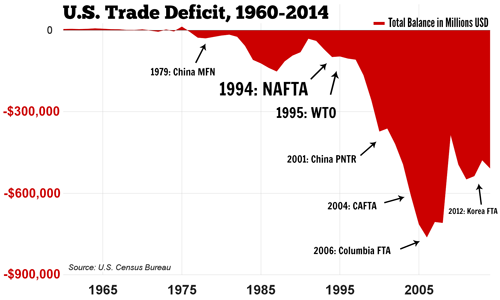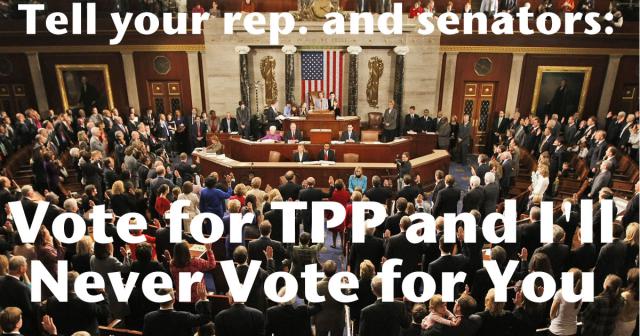 WASHINGTON, D.C.— Congresswoman Marcy Kaptur (D-OH) spoke out against the job killing Trans-Pacific Partnership (TPP) yesterday after a vote in the House of Representatives to approve “fast track” Trade Promotion Authority (TPA). Under TPA, Congress would have no opportunity to amend any proposed trade deal, would not be allowed to hold hearings with trade experts, and would be limited to 60 days to vote up or down on massive complex agreements that, at least in the case of the TPP, are approaching 1,000 pages of highly technical language.
WASHINGTON, D.C.— Congresswoman Marcy Kaptur (D-OH) spoke out against the job killing Trans-Pacific Partnership (TPP) yesterday after a vote in the House of Representatives to approve “fast track” Trade Promotion Authority (TPA). Under TPA, Congress would have no opportunity to amend any proposed trade deal, would not be allowed to hold hearings with trade experts, and would be limited to 60 days to vote up or down on massive complex agreements that, at least in the case of the TPP, are approaching 1,000 pages of highly technical language.
America’s middle class is shrinking,” said Rep. Kaptur. “Wages are flat or falling for working families, and imports into our country dwarf the exports going out. We have already given away one fifth of our economic productivity to bad trade deals. But instead of pushing through trade policies that could turn the tide for the 99 percent, the House voted to sell out working families and American industries that have been the backbone of the U.S. economy for decades.”
The U.S. trade deficit for 2014 was $508 billion dollars ($508,324,000,000). As of this April, the deficit for 2015 had already reached $171 billion dollars ($171,139,000,000). Since 1970, our cumulative U.S. trade deficit is over $10 trillion ($10,079,379,000,000). According to Robert E. Scott of the Economic Policy Institute, “A billion dollars invested in manufacturing here in the United States could support 5,000 jobs, but a billion dollars of increased trade in the form of imported goods from Asia or anywhere else would kill jobs here.”
Rep. Kaptur also spoke on the House floor before the vote. Her full statement:
If the underlying TPP is such a good deal, why is the Rules Committee limiting our ability to read it fully and amend it? By voting for Trade Promotion Authority, we handcuff Members of Congress. We should vote no.
We have a right to read it fully, and vet it fully.
 Let's look at a history of these trade agreements. Over the last 25 years, every time we have signed a so-called free trade agreement that benefits the one percent, not the 99 percent, America has lost more jobs. Post-NAFTA, look what happened. We used to have trade balances with these countries. Today they’ve all gone into deficit which means they send us more goods than we are able to get into their markets.
Let's look at a history of these trade agreements. Over the last 25 years, every time we have signed a so-called free trade agreement that benefits the one percent, not the 99 percent, America has lost more jobs. Post-NAFTA, look what happened. We used to have trade balances with these countries. Today they’ve all gone into deficit which means they send us more goods than we are able to get into their markets.
Here's what happened after the WTO: we got into the China PNTR deal, then the Columbia deal, then with Korea. There hasn’t been a balanced trade account in this country for 30 years.
40 million lost jobs, 9.5 trillion dollars of trade deficit, trading away one fifth of our economic might to other places. And what did the American people get? Lost jobs, outsourced jobs, stagnant wages, average income in regions like mine are $7,000 less per year than 25 years ago. Not a good deal.
You can’t create jobs in America and have free trade when you have closed markets abroad. Japan is closed. Korea is closed. China is closed. Europe limits 10 percent imports. We don’t. We have an open market.
And you can’t create jobs and have free trade when you try to trade with countries where their people have no legal rights.
This Congress should vote no on this Trans-Pacific Partnership, the underlying bill, and on Trade Promotion Authority because we have a right to read the agreement and openly debate it. Right now we have to go down to a secure room, we have people that monitor us, and we can’t even talk to the American people about what’s in it. What’s free about that?
The Executive branch has totally overreached its power. Only five titles of the 29 in the TPP are actually about tariffs. This bill is a treaty! It should be considered as a treaty, openly read by the Senate, and it should be able to be amended and fully vetted.
This is so important, when we have gone through a quarter century of job loss and income loss by the American people. Why can’t we produce a bill that benefits the 100 percent, not just the one percent that was able to pay for the plane tickets to go over to Asia and represent important trans-national interests? We can’t accept deals that just represent the interests of those companies. We have to represent the interests of the American people.
Let's balance these trade accounts and develop a new trade model, not a NAFTA-based trade model, but a model that produces jobs in America, good wages and balanced trade accounts for the first time in a quarter century.

